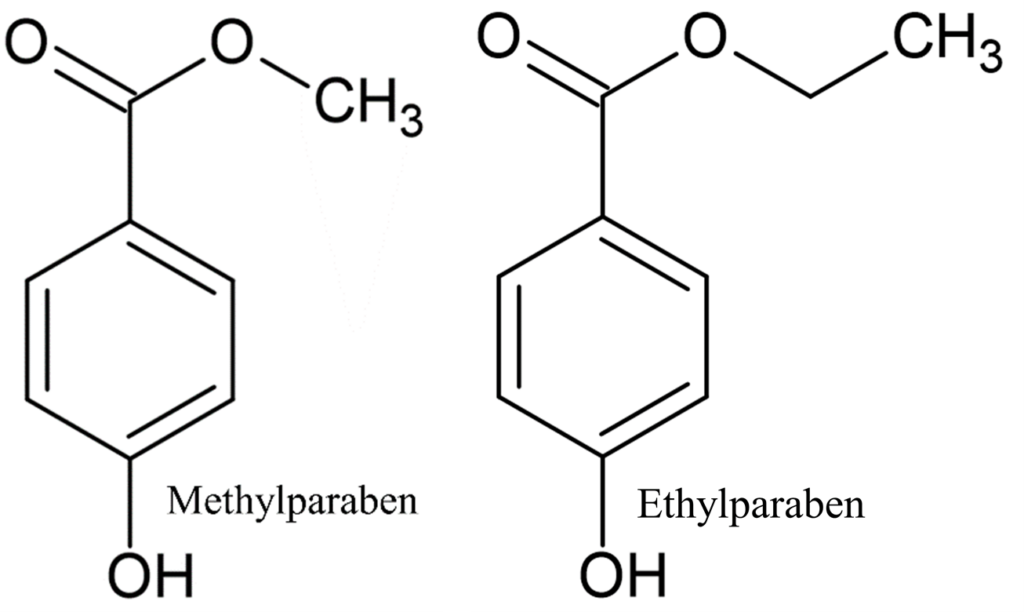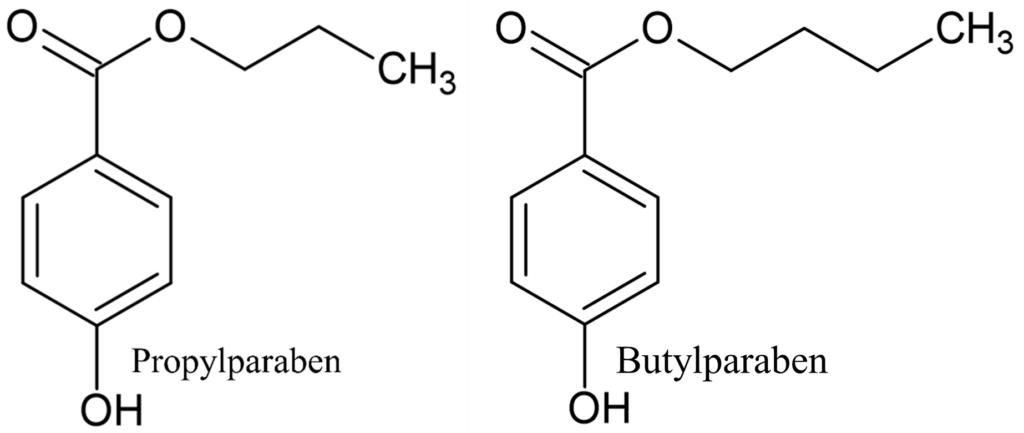What are parabens?
Parabens are a series of chemicals that are often used as preservatives in food, cosmetic and pharmaceutical products. The word “Paraben” is a shortened from of the word describing the series of molecules know as PARAhydroxyBENzoates.
General Structure:

The series is built by replacing the “R” with various hydrocarbon chains of varying length.


History of use:
The history of parabens dates back to the early 20th century when they were discovered to have excellent antimicrobial properties. Parabens effectively prevent the growth of bacteria and fungi, thus extending the shelf life of products. Due to their effectiveness and affordability, parabens became widely used in a variety of cosmetic products, including creams, lotions, shampoos, and deodorants. However, in recent years, concerns have arisen about their potential endocrine-disrupting effects, leading to increased scrutiny and the development of paraben-free alternatives.
The paraben series of preservatives has been continuously examined over the decades to determine their safety of use in consumer products.
Safety Concerns:
Although parabens are very effective when used as a preservative there has been repeated concerns about their ability to participate in unwanted reactions in the body. This is an ongoing debate. A study in Europe by the Scientific Panel on Food Additives in 2004 determined an Acceptable Daily Intake (ADI) of 10mg/kg Body weight for methyl- and ethyl parabens but found that propylparaben should not be included in this group due to adverse effects observed during the testing [1]. A reexamination of the paraben series in 2020 concluded that methyl- and ethyl parabens are safe in cosmetics in the present practices of use and concentration described in this safety assessment when the sum of the total parabens in any given formulation does not exceed 0.8% [2]. In spite of the findings of the panels that has been growing evidence that the presence of parabens in the body has detrimental effects on biological processes.
Endocrine Disruption:
Parabens have been linked to endocrine disruption due to their similarity to estrogen. This could potentially interfere with hormone balance and affect reproductive health and other processes [3-6].
Potential Carcinogenicity:
There is evidence suggesting that parabens may interfere with the natural processes of breast cells, potentially contributing to abnormal growth and increasing the risk of breast cancer [7-10].
While parabens have proven effective preservatives, concerns about potential side effects raise questions about their continued use in consumer products…especially when there are alternatives available.
Paraben is not used as a preservative in Manufaktur PUR products.
[1]Anton et. Al., “Opinion of the Scientific Panel on Food Additives, Flavourings, Processing Aids and Materials in Contact with Food on a Request from the Commission related to para hydroxybenzoates (E 214–219)” EFSA J. Vol. 2, (9) Sep 2004
[2]“Amended Safety Assessment of Parabens as Used in Cosmetics”, Int J Toxicol., 39 (1), (2020), pp. 5-97
[3]Azeredo et al., “Environmental Endocrinology: Parabens Hazardous Effects on Hypothalamic-Pituitary-Thyroid Axis”, Int J Mol Sci., 24(20), (2023)15246
[4]Nowac et al., “Parabens and their effects on the endocrine system” Mol Cell Endocrinol., Vol. 474, (2018), pp. 238-251
[5]Boberg et al., “Possible endocrine disrupting effects of parabens and their metabolites”, Reprod Toxicol., 30(2), (2010), pp. 301-12.
[6]Vitku et al,. “Endocrine disruptors of the bisphenol and paraben families and bone metabolism”, Physiol Res., 28;67(Suppl 3), (2018), pp. 455-S464.
[7] Amin et al., “Paraben Content in Adjacent Normal-malignant Breast Tissues from Women with Breast Cancer”, Biomed. Environ. Sci., 32 (12) (2019), pp. 893-904
[8] Darbre et al., “Concentrations of parabens in human breast tumours”, J. Appl. Toxicol., 24 (1) (2004), pp. 5-13
[9] Downs et al., “Parabens preferentially accumulate in metastatic breast tumors compared to benign breast tumors and the association of breast cancer risk factors with paraben accumulation”, Envr. Adv., Vol. 11, (2023), 100325
[10] Hager et al.,“Minireview: Parabens Exposure and Breast Cancer”, Int. J. Environ. Res. Public Health. 2022 Feb; 19 (3) (2022), pp 1873.
